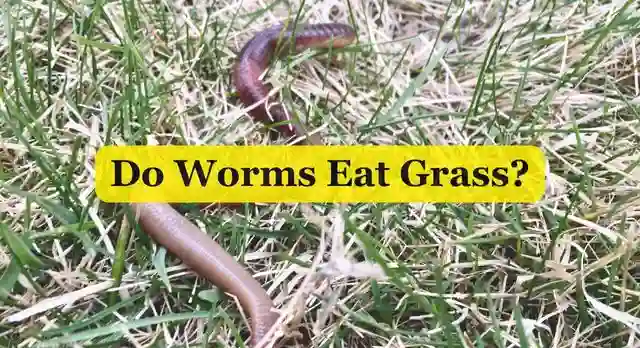Do Worms Eat Grass? Role of Worms in Lawn Health
Have you ever wondered if worms eat grass? The thought of these tiny creatures feasting on your lush green lawn might raise some questions. In this article, we will explore the fascinating relationship between worms and grass and uncover the role of worms in maintaining a healthy lawn. So, put on your gardening hat and let’s dive into the world beneath your feet.

The Role of Worms in Lawn Health
Worms, particularly earthworms, are unsung heroes when it comes to maintaining a healthy lawn. They play a vital role in soil aeration, nutrient recycling, and the breakdown of organic matter. Their tunneling activities improve soil structure, enhance water absorption, and promote root growth, resulting in a healthier and more resilient lawn.
Do Worms Actually Eat Grass?
Contrary to popular belief, worms do not eat grass as their primary food source. While they may consume small amounts of grass clippings in the process of feeding on decaying plant material, their diet primarily consists of organic matter like leaves, dead roots, and microorganisms found in the soil. Worms indirectly benefit grass by improving soil conditions and nutrient availability, making it easier for grassroots to access essential elements.
The Benefits of Worms in Lawn Care
Having worms in your lawn offers numerous benefits beyond their diet. Let’s explore the advantages they bring to lawn health:
Soil Aeration: Worms create tunnels as they move through the soil, enhancing air circulation and improving oxygen levels. This aeration allows grassroots to breathe, promoting their growth and overall vitality.
Nutrient Cycling: Worms consume organic matter and excrete nutrient-rich castings. These castings are packed with beneficial microbes and nutrients that can enhance the nutrient profile of the soil, promoting healthy grass growth.
Water Absorption: Worm burrows act as channels for water to infiltrate the soil. This improves the lawn’s ability to absorb and retain water, reducing surface runoff and enhancing its drought tolerance.
Soil Structure: Worms improve soil structure by breaking down organic matter and loosening compacted soil. This creates a favorable environment for grassroots to spread and establish themselves.
Promoting a Worm-Friendly Lawn
To encourage the presence of worms in your lawn and optimize their benefits, here are some tips to follow:
Minimize Chemical Use: Reduce the use of chemical fertilizers, pesticides, and herbicides in your lawn care routine. Chemicals can harm worms and disrupt the delicate balance of the soil ecosystem.
Add Organic Matter: Incorporate organic matter into your lawn, such as compost or well-rotted manure. This provides a continuous source of food for worms and improves soil fertility.
Mow with Care: Avoid cutting the grass too short, as it can damage the root system and limit worm activity. Set your mower blades to a suitable height that promotes healthy grass growth and allows worms to thrive.
Water Wisely: Maintain proper watering practices to keep the soil moist but not waterlogged. Adequate moisture levels support worm activity and contribute to a healthier lawn.
What does an earthworm eat in their diet
Key Takeaway
While worms do not directly consume grass, their presence in your lawn has significant benefits. Worms contribute to soil aeration, nutrient recycling, and overall soil health, promoting the growth and resilience of your grass. By creating a worm-friendly environment through organic matter additions, responsible lawn care practices, and minimizing chemical use, you can harness the power of worms to achieve a lush and vibrant lawn. So, embrace the underground workforce of worms and witness the positive transformation they bring to your lawn ecosystem.
Related Article
What type of grass do worms eat?
Worms do not have a specific preference for a particular type of grass. They primarily feed on decaying plant material, including grass clippings, dead leaves, and roots. As long as the grass is organic and in a state of decomposition, worms can consume it. So, whether you have Kentucky bluegrass, Bermuda grass, or any other type of grass, worms will happily help break it down.
Can worms decompose grass?
Yes, worms play a crucial role in decomposing grass. They feed on grass clippings and other organic matter, breaking them down into smaller particles. As worms digest the organic material, they excrete nutrient-rich castings, which contribute to the decomposition process. These castings, also known as worm castings, contain beneficial microbes that further break down the grass and release nutrients back into the soil. So, worms are essential contributors to the decomposition of grass, aiding in nutrient recycling and soil health.
Do earthworms eat grass?
Yes, earthworms eat grass. As natural decomposers, earthworms play a crucial role in breaking down organic matter, including grass. When earthworms come across grass, they use their mouths to consume it. Inside their digestive system, the grass is broken down into smaller pieces with the help of specialized enzymes. Earthworms extract nutrients from the grass, and the remaining waste is expelled as nutrient-rich castings.
